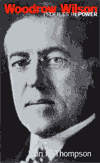| |
BOOK
REVIEW
Wilsonian
idealism reconsidered
Woodrow Wilson (Profiles in Power
series) by John Thompson
Reviewed by Sreeram Chaulia
 Historian
Robert Tucker once remarked, "Wilsonianism
is a many-splendored thing." It has been
attributed to as widely divergent figures as
Jawaharlal Nehru of India, former US presidents
Ronald Reagan and Harry Truman as well as South
African statesman Nelson Mandela. Those who
cling to standard liberal representations of
Wilsonian idealism recoil at reactionary and
realist politicians being termed Wilsonian, but
revisionists often make the point that Woodrow
Wilson was not a drifting dreamer but a
practitioner of "higher realism" who
rejected imposition of one powerful nation's
will on other great people. Some have seen
Wilson's presidential policies as stemming from
deep Christian values of the US South, while
others label him "evangelist of American
political economy", whose main aim was a
liberal capitalist world order that the United
States could dominate. If political scientist
Hans Morgenthau lambasted Wilson's
"utopianism, legalism and
sentimentalism", many of the president's
contemporaries were staggered by his
opportunism, sacrificing "any opinion at
any moment for his own benefit and going back on
it the next moment if he thought it would be
profitable". Historian
Robert Tucker once remarked, "Wilsonianism
is a many-splendored thing." It has been
attributed to as widely divergent figures as
Jawaharlal Nehru of India, former US presidents
Ronald Reagan and Harry Truman as well as South
African statesman Nelson Mandela. Those who
cling to standard liberal representations of
Wilsonian idealism recoil at reactionary and
realist politicians being termed Wilsonian, but
revisionists often make the point that Woodrow
Wilson was not a drifting dreamer but a
practitioner of "higher realism" who
rejected imposition of one powerful nation's
will on other great people. Some have seen
Wilson's presidential policies as stemming from
deep Christian values of the US South, while
others label him "evangelist of American
political economy", whose main aim was a
liberal capitalist world order that the United
States could dominate. If political scientist
Hans Morgenthau lambasted Wilson's
"utopianism, legalism and
sentimentalism", many of the president's
contemporaries were staggered by his
opportunism, sacrificing "any opinion at
any moment for his own benefit and going back on
it the next moment if he thought it would be
profitable".
Who was the real Woodrow Wilson? Historian John
Thompson's biography of the man who was briefly
the most famous leader of the world draws on
newly released archives and presents a more
rounded view of his personality and philosophy.
The author unearths little-known facets of
Wilson's leadership style and belief system to
present a balanced picture of the US president
who fatefully ushered his hitherto isolated
country into the maelstrom of world politics.
Born in 1856 to a family of Presbyterian
ministers, Wilson grew up sharing the general
Southern middle-class racist attitudes premised
on white superiority. Though deeply religious,
Wilson's thinking in matters of the world was
entirely secular. He "did not see politics
as primarily an arena for the realization of
Christian values". As a law student in
Virginia and Princeton, he practiced elocution
with great passion "to get a mastery of
correct and elegant expression for the
future" (p 20). He was intensely ambitious
and unusually focused, citing "the latent
politician within me" to give up law
practice for studying history and political
science at Johns Hopkins University in 1883.
Wilson's early publications decried
"despotism" of congressional
committees and the decline of presidential
prerogatives. He shared the general
dissatisfaction with the then state of US
government by harping that it offered few
positions of "commanding authority for men
of real ability". The US
"congressional government" was
inferior in Wilson's eyes to British
"cabinet government", since the latter
had a single center of authority. He idolized
British conservative Edmund Burke for his
"hostility to abstract reasoning in
politics" and "profoundly practical
and utilitarian gospel of expediency" (p
34).
Contrary to pious pretense, Wilson stressed the
limitations of public opinion in democracy and
attached himself to a heroic conception of
leadership that rejected the "Rousseauite
view of popular sovereignty" (a reference
to 18th-century Swiss-French philosopher, author
and political theorist Jean Jacques Rousseau).
Simultaneously, he held that leaders must always
be conscious of the need to develop public
support for their positions and stay in tune
with the thoughts and feelings of the majority.
In 1902, Wilson was appointed president of
Princeton University, a pedestal he utilized to
deliver addresses on national politics and enter
the Democratic Party ranks. As early as 1906,
Wilson was mentioned as a possible candidate for
the US presidency. Among his achievements at
Princeton was an overhaul of the undergraduate
course of study by reconciling and coordinating
the ideas of others. Controversies surrounding
location of the campus of the graduate college
gave him a new political identity as a fighter
against the power of aristocracy and social
privilege. Big-business infelicities had been
subject to growing agitation in the country and
Wilson caught the pulse of the times by adopting
the rhetoric of attacking exclusive social
claques.
In 1910, Wilson ran for governor of New Jersey
state and won handsomely. "Whereas in the
mid-1900s his targets had been populists,
radical theorists and nostrums of socialists, by
1912 he was warning of the 'pervasive power of
the great interests which now dominate our
development'" (p 52). Encouraged by the
reception to his speeches denouncing
"machine politics" and plutocracy,
Wilson set up campaign headquarters for the 1912
Democratic presidential nomination. Though
embarrassed for his volte face from
conservative to "progressive
Democrat", Wilson managed to get nominated
by a two-thirds majority. Riding on a wave of
antitrust legislation, Wilson defeated Theodore
Roosevelt (who stood as a Progressive Party
candidate) and Republican William Taft to reach
the pinnacle.
President Wilson immediately backtracked on
left-leaning electoral promises. He chose
conservative cabinet members and reassured Wall
Street against victimization. Black leaders were
disappointed when the Wilson administration
began segregating federal employees by race. On
the other side of the balance sheet, Wilson
greatly reduced the level of import duties,
passed a banking-sector regulatory act and
checked unfair trade practices. "His
positions on policy issues are explained by
pragmatic considerations than by any ideological
conviction" (p 77).
In foreign affairs, Wilson gloated at his
"power to control them absolutely"
(contrasted to the 1880s and 1890s). He
displayed a variety of sometimes conflicting
impulses, arguing that the United States had
"not an errand of conquest, but an errand
of service", but also that there was
"no more glorious way to die than in
battle" (p 79). In the American hemisphere,
Wilson insisted on maintaining US hegemony. US
military force was inserted to effect regime
change in Nicaragua and take direct control of
Haiti and Santo Domingo. In 1914, Wilson
prepared for a full naval blockade of Mexico and
the occupation of Tampico and Veracruz, only to
hold back in the end saying there were "no
conceivable circumstances for us to direct by
force the internal processes of what is a
profound revolution" (p 87). Widespread
approval of Wilson's early neutral
non-involvement stance in World War I was one of
the factors that aided his re-election in 1916.
The years 1915 and 1916 were watershed ones in
US foreign policy. German U-boat submarines
torpedoed merchant ships. The Lusitania sinking
killed 128 Americans. Wilson skillfully placed
himself on the middle ground between the
belligerent reaction of Roosevelt and the
pacifism of his secretary of state, William
Bryan. He demanded that the German government
pay reparations and prevent recurrence of
attacks on civilian liners, but rebuffed calls
for entering the war. Yet the regular army and
National Guard were enlarged and a big
shipbuilding program was authorized.
In 1916, Wilson committed the United States to
participation in a postwar League of Nations,
spurred by desire to bring an early end to the
war. The promise of full US participation in an
international organization to keep peace and
security of all countries was a carrot to
war-weary Europeans to look for an armistice.
Wilson's rhetoric flourished through calls for
"a new and more wholesome diplomacy",
condemnation of power politics and stress on
"inviolable rights of peoples and of
mankind". He claimed to be "speaking
for the silent mass of mankind everywhere who
have as yet had not place or opportunity to
speak their real hearts out" (p 134).
Germany's decision to launch full-scale
submarine war on commercial shipping and the
failure of "armed neutrality" soon led
Wilson to declare the US at war, but this
monumental decision was justified as necessary
so that he "would have a hand at the peace
table". US entry into World War I produced
an interesting change in Wilson's conception of
the League of Nations. Reversing earlier talk of
universal membership, he pronounced that
"either all governments must become
democratic or some would be excluded". This
was intended to minimize disagreements with
European allies who were loath to allow Germany
and its friends membership of the league.
Wilson's "national self-determination
principle" was also watered down in early
1918 to exclude subjects of the French and
British empires from autonomous development.
On the eve of the Paris Peace Conference, Allied
governments conceded the importance of Wilson's
ideas, but with German power irretrievably
broken, there was no effective challenge to a
punitive peace. Wilson shouldered millennial
expectations when he arrived in Europe for a
six-month diplomatic roulette in December 1918
but, in reality, the cards he held to forge a
just peace were not as formidable as he and his
well-wishers presumed. He could not negotiate
any reduction in Allied debts in return for
going soft on Germany as the US Congress
controlled the purse strings. Wilson's trump
card of a separate peace with Germany was too
risky to be implemented and a resurgent right
wing, represented by David Lloyd George in
Britain, Georges Clemenceau in France and Benito
Mussolini in Italy, was keen on vengeance.
Wilson's visceral attachment to the league was
exploited by the British, who saw cooperation in
carving an international organization as
"something for which we could hope to
secure concessions in return" (p 197).
Wilson acquiesced on an executive council in the
league with permanent members from the Great
Powers (segued into the United Nations Security
Council) and rotating representation from
"middle" and "minor" states.
Territorial changes tied to self-determination
were dropped on Allied insistence that this
would destabilize Eastern Europe. Wilson
vehemently opposed grabbing of German colonies
by Allied states, but he had to condone the
league's new mandate systems that were
"little more than fig leaves for
annexation" (p 202).
While Wilson was yielding on principles in
Paris, the Republican-majority Congress was
railing against the league for its
"restrictions on America's independence of
action". Political difficulties at home,
spearheaded by Henry Cabot Lodge's vigorous
anti-league movement, lowered Wilson's prestige
in Europe and allowed Clemenceau's accusation
that Wilson was "pro-German". Wilson's
intransigent stand against Italian claims to
territory on the Dalmatian coast posed the
danger that Rome would opt out of the league.
Sensing a slippery slope, Japan announced that
if it were not granted Chinese Shantung, it,
too, would boycott the league. The overall
result of inter-Allied bickering and Wilson's
declining influence was a shockingly harsh
Treaty of Versailles for Germany, the vehicle
for Adolf Hitler's rise.
Back home, Wilson's fight to secure Senate
approval for the treaty lasted months and ended
in bitter failure. Republicans were bent on
reasserting Congressional pressures after
wartime exercise of extraordinary presidential
powers. Wilson went on a countrywide public
speaking spree to garner support and made some
memorable speeches. "Dare we reject the
league and break the heart of the world?"
he queried. The league, he asserted, "is
the only possible guarantee against war, a 98
percent insurance ... if America goes back upon
mankind, mankind has no other place to turn ...
either we are going to guarantee civilization or
we are going to abandon it" (p 229).
Sentiments in the country and in Senate were,
however, not conducive to international
commitment by the US, and Wilson's league
proposal failed to get the mandatory two-thirds
ratification.
In the 1920 presidential election, Wilson became
"as unpopular as he had once been
popular", the Senate loss ringing as a
personal defeat for the president. Republicans
targeted ethnic community vote banks that Wilson
had offended, particularly German, Italian and
Irish Americans. The results were a massive
repudiation of Wilson, who quit office totally
broken-hearted, the 1920 Nobel Peace Prize award
notwithstanding.
Woodrow Wilson was a product of his time and
background, a practical politician who did
several bargains in his career. He was never a
stickler for a moral if it redounded to his
political growth. Had he gazed into the crystal
ball and glimpsed the anti-league wave in the
1920 poll, he would most certainly have accepted
amendments to the peace treaty. Wilson's was a
classic case of the maxim that politics is the
art of the possible. The ultimate message from
John Thompson's exegesis is that considerable
discretion must be employed in usage of the word
"Wilsonian".
Woodrow Wilson, (Profiles in Power
series) by John Thompson. Pearson
Education Limited, New York, 2002. ISBN:
0-582-24737-3. Price: US$15.95, 265 pages.
(©2003 Asia Times Online Co, Ltd. All rights
reserved. Please contact [email protected]
for information on our sales and syndication
policies.) |
| |
|
|
 |
|




 Historian
Robert Tucker once remarked, "Wilsonianism
is a many-splendored thing." It has been
attributed to as widely divergent figures as
Jawaharlal Nehru of India, former US presidents
Ronald Reagan and Harry Truman as well as South
African statesman Nelson Mandela. Those who
cling to standard liberal representations of
Wilsonian idealism recoil at reactionary and
realist politicians being termed Wilsonian, but
revisionists often make the point that Woodrow
Wilson was not a drifting dreamer but a
practitioner of "higher realism" who
rejected imposition of one powerful nation's
will on other great people. Some have seen
Wilson's presidential policies as stemming from
deep Christian values of the US South, while
others label him "evangelist of American
political economy", whose main aim was a
liberal capitalist world order that the United
States could dominate. If political scientist
Hans Morgenthau lambasted Wilson's
"utopianism, legalism and
sentimentalism", many of the president's
contemporaries were staggered by his
opportunism, sacrificing "any opinion at
any moment for his own benefit and going back on
it the next moment if he thought it would be
profitable".
Historian
Robert Tucker once remarked, "Wilsonianism
is a many-splendored thing." It has been
attributed to as widely divergent figures as
Jawaharlal Nehru of India, former US presidents
Ronald Reagan and Harry Truman as well as South
African statesman Nelson Mandela. Those who
cling to standard liberal representations of
Wilsonian idealism recoil at reactionary and
realist politicians being termed Wilsonian, but
revisionists often make the point that Woodrow
Wilson was not a drifting dreamer but a
practitioner of "higher realism" who
rejected imposition of one powerful nation's
will on other great people. Some have seen
Wilson's presidential policies as stemming from
deep Christian values of the US South, while
others label him "evangelist of American
political economy", whose main aim was a
liberal capitalist world order that the United
States could dominate. If political scientist
Hans Morgenthau lambasted Wilson's
"utopianism, legalism and
sentimentalism", many of the president's
contemporaries were staggered by his
opportunism, sacrificing "any opinion at
any moment for his own benefit and going back on
it the next moment if he thought it would be
profitable".






